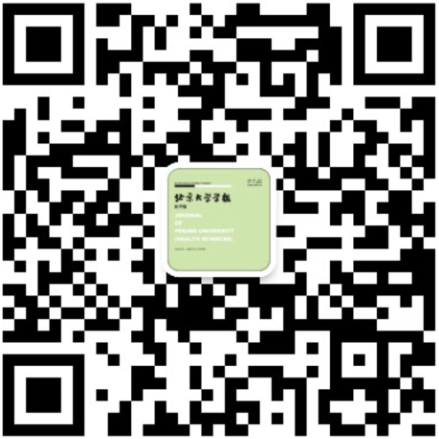北京大学学报(医学版) ›› 2024, Vol. 56 ›› Issue (5): 828-832. doi: 10.19723/j.issn.1671-167X.2024.05.012
中文版口腔健康素养量表简版(HeLD-14)在学龄前儿童家长中应用的信度和效度评价
赵双云1, 邹思雨2, 李雪莹2, 沈丽娟2, 周虹2,*( )
)
- 1. 北京大学口腔医学院·口腔医院儿科,国家口腔医学中心,国家口腔疾病临床医学研究中心,口腔生物材料和数字诊疗装备国家工程研究中心,北京 100081
2. 北京大学公共卫生学院妇幼卫生学系/北京大学医学部-潍坊市妇幼健康联合研究中心/国家卫健委生育健康重点实验室,北京 100191
Evaluation of reliability and validity of Chinese version of a short-form of Health Literacy Dental scale (HeLD-14) in the application among parents of preschool children
Shuangyun ZHAO1, Siyu ZOU2, Xueying LI2, Lijuan SHEN2, Hong ZHOU2,*( )
)
- 1. Department of Pediatrics, Peking University School and Hospital of Stomatology & National Center for Stomatology & National Clinical Research Center for Oral Diseases & National Engineering Research Center of Oral Biomaterials and Digi-tal Medical Devices, Beijing 100081, China
2. Department of Maternal and Child Health, Peking University School of Public Health/Peking University Health Science Center-Weifang Joint Research Center for Maternal and Child Health/National Health Commission Key Laboratory of Reproductive Health, Beijing 100191, China
摘要:
目的: 评价中文版口腔健康素养量表简版(a short-form Health Literacy Dental scale,HeLD-14)在3~6岁学龄前儿童家长中应用的信度和效度。方法: 2021年在北京市延庆区幼儿园通过电子问卷共调查1 479名学龄前儿童家长,了解儿童家长的一般情况、口腔健康素养相关内容。运用SPSS 21.0和Mplus 7.4软件进行统计分析,通过Cronbach’s α系数、验证性因子分析、Pearson相关分析等方法,评价量表的内部一致性信度、结构效度、校标效度和区分效度。结果: 中文版HeLD-14量表的Cronbach’s α系数为0.958,不同维度的Cronbach’s α系数在0.778~0.963。验证性因子分析结果显示,中文版HeLD-14量表各条目因子负荷在0.719~0.977(P < 0.001),拟合指数近似误差均方根(root-mean-square error of approximation,RMSEA)为0.04,比较拟合指数(comparative fix index,CFI)为0.992,Tucker-Lewis指数(Tucker-Lewis index,TLI)为0.988,模型拟合优度良好。中文版HeLD-14量表总分及关注、理解、支持、经济负担、就医、沟通、运用维度得分均与一般自我效能感正相关,相关系数分别为0.439、0.406、0.370、0.344、0.346、0.367、0.373、0.390(P均 < 0.05)。HeLD-14量表得分排在前27%的高分组3~6岁儿童家长的口腔健康素养平均得分高于得分排在后27%的低分组(69.27±1.06 vs. 41.29±11.09,t=48.13,P < 0.01)。结论: 中文版HeLD-14量表在3~6岁学龄前儿童家长中具有良好的信度和效度,可以作为评估学龄前儿童家长口腔健康素养的工具。
中图分类号:
- R174
| 1 | 孟圆, 刘雪楠, 郑树国. 国内外口腔疾病负担的现况和分析[J]. 中华口腔医学杂志, 2017, 52 (6): 386- 389. |
| 2 | 王兴. 第四次全国口腔健康流行病学调查报告[M]. 北京: 人民卫生出版社, 2018. |
| 3 | U.S. Department of Health and Human Services. Healthy people 2010: Understanding and improving health [R]. Washington, DC: U.S. Department of Health and Human Services, Goverment Printing Office, 2000. |
| 4 | Brega AG , Thomas JF , Henderson WG , et al. Association of parental health literacy with oral health of Navajo Nation preschoolers[J]. Health Educ Res, 2016, 31 (1): 70- 81. |
| 5 | Bridges SM , Parthasarathy DS , Wong HM , et al. The relationship between caregiver functional oral health literacy and child oral health status[J]. Patient Educ Couns, 2014, 94 (3): 411- 416. |
| 6 | Miller E , Lee JY , DeWalt DA , et al. Impact of caregiver literacy on children's oral health outcomes[J]. Pediatrics, 2010, 126 (1): 107- 114. |
| 7 | Duijster D , de Jong-Lenters M , de Ruiter C , et al. Parental and family-related influences on dental caries in children of Dutch, Moroccan and Turkish origin[J]. Community Dent Oral Epide-miol, 2015, 43 (2): 152- 162. |
| 8 | 李雪琦, 陈思韩, 余红兵, 等. 深圳市南山区儿童家长口腔健康素养促进的干预效果评估[J]. 口腔疾病防治, 2016, 24 (2): 105- 107. |
| 9 | 杨玉慧. 家长口腔健康素养在学生牙病防治中的作用分析[J]. 数理医药学杂志, 2016, 29 (9): 1411- 1412. |
| 10 | Vann WF Jr. , Lee JY , Baker D , et al. Oral health literacy among female caregivers: Impact on oral health outcomes in early childhood[J]. J Dent Res, 2010, 89 (12): 1395- 1400. |
| 11 | Jones K , Brennan D , Parker E , et al. Development of a short-form Health Literacy Dental Scale (HeLD-14)[J]. Community Dent Oral Epidemiol, 2015, 43 (2): 143- 151. |
| 12 | 李艳婷, 陈晨, 金英淑. 口腔健康素养研究进展[J]. 职业与健康, 2018, 34 (11): 1581- 1584. |
| 13 | 王才康, 胡中锋, 刘勇. 一般自我效能感量表的信度和效度研究[J]. 应用心理学, 2001, (1): 37- 40. |
| 14 | 万娅姣, 赵忆文. 成人口腔健康素养测量工具的研究进展[J]. 护理管理杂志, 2016, 16 (3): 176- 178. |
| 15 | 陈满满. 孕妇口腔健康素养、自我效能与口腔健康相关生活质量的相关性研究[D]. 武汉: 武汉轻工大学, 2018. |
| 16 | Ju X , Brennan DS , Parker E , et al. Confirmatory factor analysis of the health literacy in dentistry scale (HeLD) in the Australian population[J]. Community Dent Health, 2018, 35 (3): 140- 147. |
| 17 | Mialhe FL , Bado FMR , Ju X , et al. Validation of the health lite-racy in dentistry scale in Brazilian adults[J]. Int Dent J, 2020, 70 (2): 116- 126. |
| 18 | Mialhe FL , Tenani CF , DE Checchi MHR , et al. Psychometric properties of health literacy in dentistry scale in an elderly Bra-zilian population[J]. Braz Oral Res, 2020, 34, e021. |
| 19 | Yazdani R , Esfahani EN , Kharazifard MJ . Relationship of oral health literacy with dental caries and oral health behavior of children and their parents[J]. J Dent (Tehran), 2018, 15 (5): 275- 282. |
| [1] | 沈鹤军,侍崇艳,郑清,黄玉,景涛. 我国高中生静坐时长与健康素养现状及其影响因素调查[J]. 北京大学学报(医学版), 2024, 56(2): 239-246. |
| [2] | 弭小艺,侯杉杉,付子苑,周末,李昕璇,孟召学,蒋华芳,周虹. 中文版童年不良经历问卷在学龄前儿童父母中应用的信效度评价[J]. 北京大学学报(医学版), 2023, 55(3): 408-414. |
| [3] | 蒋青,张雨. 新形势下运动损伤特点及细胞生物治疗的应用前景和挑战[J]. 北京大学学报(医学版), 2021, 53(5): 828-831. |
| [4] | 王晓琪,陈美君,云青萍,孙思伟,王熙凯,史宇晖,纪颖,管仲军,常春. 门诊患者健康素养对就医体验的影响及机制[J]. 北京大学学报(医学版), 2021, 53(3): 560-565. |
| [5] | 邱天成,刘筱菁,薛竹林,李自力. 基于三维动态照相机的正常人面部表情可重复性研究[J]. 北京大学学报(医学版), 2020, 52(6): 1107-1111. |
| [6] | 张子一,夏斌,徐明明,李毅萍,唐瞻贵,陈泳清. 湖南韶山地区儿童口腔卫生干预效果评价[J]. 北京大学学报(医学版), 2020, 52(5): 913-918. |
| [7] | 曾庆奇, 常春, 蒋莹. 健康素养与高血压健康管理的关系[J]. 北京大学学报(医学版), 2014, 46(3): 492-497. |
| [8] | 郑迎东, 石建辉, 曹若湘. 中国居民健康素养调查问卷的验证性因子分析及其应用初探[J]. 北京大学学报(医学版), 2010, 42(3): 314-317. |
|
||
